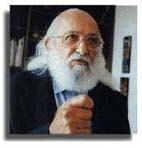Sunday, December 12, 2004
Bio of Freire

A Short Biography of Paulo Freire
by Peter Fleck
December 12, 2004
Paulo Freire was born on September 19, 1921 in Recife, Brazil. Because of the world economic crisis of the late 1920's, Freire was exposed to poverty early in his life. This influenced his views on education.
He taught in a grammar school while still in high school and went on to study law at the University of Recife where he also studied philosophy and the psychology of language. In 1944, he married Elza Maia Costa Oliveira, a primary school teacher. They had four children together.
In 1946, Freire was made Director of the Department of Education and Culture of the Social Service in the Brazilian State of Pernambuco where he was charged with improving the living conditions of factory workers. This work helped in formulating his later theories.
In 1958, Freire presented a paper entitled "Education of Adults and Marginal Populations: the Mocambos Problem" at the Second National Conference on Adult Education in Rio de Janeiro. In this paper, Freire stated that adult education for the Mocambos must have a foundation in the consciousness of everyday situations lived by the learners and that this would help in promoting democracy.
Freire was made Director of the Division of Culture and Recreation for Recife's Department of Archives and Culture in 1961. In 1962, using his theories, 300 sugarcane sharecroppers were taught to read in 45 days. When this experiment concluded, President Joao Belchior Goulart invited Freire to implement a national literacy campaign with a goal to make five million adults literate in the first year and participants in the democratic process as Brazilian law required that voters pass a literacy test.
Unfortunately, a military coup deposed Goulart in 1964 and Freire was imprisoned for two months. He finally received asylum in Bolivia for a brief time before moving to Chile for five years where he worked for Eduardo Frei's Christian Democratic Party.
In 1967, Freire published his first book, Education as the Practice of Freedom. In 1968, he published his most famous book, Pedagogy of the Oppressed. He was invited to teach at Harvard as a visiting professor in 1969. He spent a year at Harvard and then moved to Geneva, Switzerland to work with the World Congress of Churches as a special education adviser.
He was able to return to Brazil in 1980. He taught at the Catholic University of Sao Paulo and the State University of Campinas. In 1988, he was invited to take over the position of Municipal Secretary of Education in the new Workers' Party administration in Sao Paulo.
Freire died of heart failure on May 2, 1997.
Theory
Freire is best-known for attacking what he identified as the banking idea of education, where a student is viewed as an empty account to be filled with a "deposit" by the teacher. Instead, he advocated dialog and critical thought. His theories have influenced literacy programs and adult learning worldwide although many of these programs tend to ignore the more revolutionary aspects of his thought.
Freire's method of teaching become known as liberatory education, defined as "mutually supported learning for empowerment" (Heaney). Freire's view was that education is political. Based on his literacy campaigns in Brazil and Chile, which were integrated with programs of revolution and social change, he suggested several pedagogical techniques including reflecting on political content from the learner's daily experience, organizing "culture circles" to promote dialogue and interaction with peers, and using the "people's knowledge" as the basis for a curriculum.
Freire's concept of liberatory education also relies on the learner attaining critical consciousness. He describes this consciousness in three stages. First is "semi-intransitive" consciousness where perception is limited and focus is on survival. Second is "naive transitivity" where represented by traits such as over-simplification of problems, longing for the past, and a disinterest in investigation. Finally comes "critical transitivity," "characterized by depth in the interpretation of problems, by testing one's own findings and openness to revision and reconstruction" (Heaney).
Freire's emphasis on people working with one another (and not on one another) via dialogues and by situating the learning within the experience of the students, has had great influence on informal and adult education. His goal was to incite radical social change through education by using a "pedagogy of the oppressed" or a "pedagogy of hope."
Application
Freire's theories regarding the equality of the teacher and student and a curriculum built on the student's life could be well-applied to current instructional design via the emerging social networking applications. Given the right training and access to a computer, students would be able to use their developing literacy skills on both blogs and wikis to form opinions and carry on conversations. This would be in addition to face-to-face meetings with discussion. This would also allow for worldwide linking and the possibility of a true social-change agenda.
Freire's philosophies fit well with current education and business training theories involving situated learning and communities of practice which share a similarity with Freire's culture circles.
It should again be mentioned that Freire saw his methodology as standing outside of the status quo of the oppressor and preparing the oppressed to work at radical social change. In utilizing his ideas today, practitioners often strip them of these social change aspects.
Sources
Heaney, Tom. "Issues in Freirean Pedagogy." June 20, 1995. [http://www.paulofreireinstitute.org/Documents/freiren_pedagogy_by_Tom_Heaney.html] [Visited December 12, 2004]
Lownd, Peter. Freire's Life and Work. no date. [http://www.paulofreireinstitute.org/Documents/PF-life_and_work_by_Peter.html] [Visited December 12, 2004]
Paulo Freire. Wikipedia. [http://en.wikipedia.org/wiki/Paulo_Freire] [Visited December 12, 2004]
Smith, Mark K. Paulo Freire. May 8, 1997. [http://www.infed.org/thinkers/et-freir.htm] [Visited December 12, 2004]
Resources
del.icio.us social bookmarks for 'freire'
